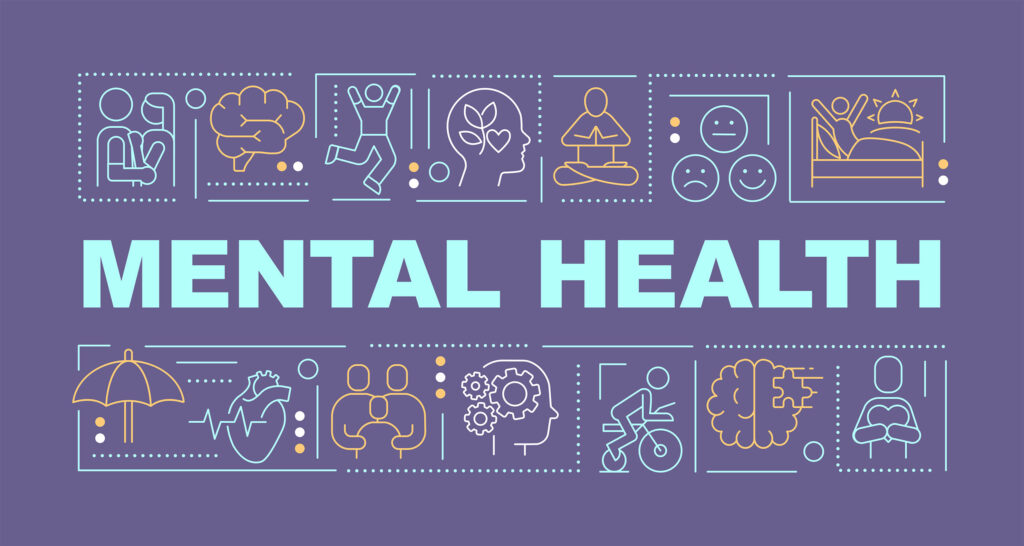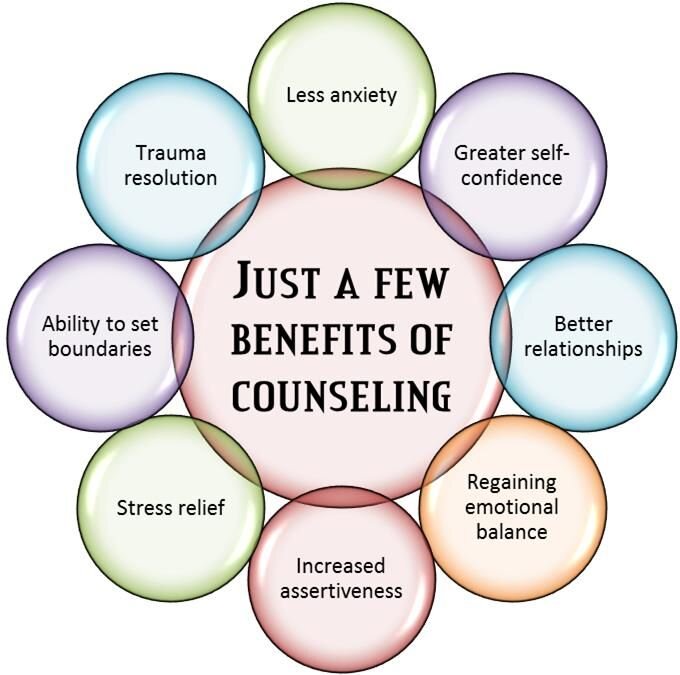Cognitive Behavioural Therapy: How It Transforms Thought Patterns
Opening the Secrets of Mental Wellness: A Review of Therapy and Treatment Choices
Mental health and wellness is a complicated and essential element of general health. Many counseling and therapy choices exist to resolve numerous psychological challenges. Each technique uses special advantages and techniques customized to specific demands. Understanding these choices is important for anybody looking for to improve their mental health. Marriage Counselling. What variables should one think about when exploring these opportunities? The solution may expose a course to a much healthier emotion
Understanding Mental Wellness and Its Importance
Psychological health encompasses the emotional, emotional, and social well-being of people, substantially affecting exactly how they think, really feel, and act. Its importance can not be overemphasized, as it influences every facet of life, consisting of partnerships, job performance, and general high quality of life. Individuals with good mental health and wellness have a tendency to cope with anxiety better, maintain much healthier connections, and make notified decisions. Conversely, bad psychological wellness can lead to emotional distress, damaged performance, and numerous mental illness, which may need expert intervention. Recognizing psychological wellness is important for recognizing the indications of distress and the requirement for assistance. Recognition likewise promotes empathy and decreases preconception, encouraging individuals to look for help when needed. By prioritizing mental health, communities can cultivate settings that sustain emotional well-being, ultimately bring about healthier, more durable people. This structure functions as a vital step towards effective mental health and wellness therapy and treatment choices.
Types of Counseling Strategies
Therapy methods vary widely, each customized to satisfy the special requirements of individuals seeking assistance. Among the most common kinds are cognitive-behavioral treatment (CBT), which focuses on identifying and altering negative thought patterns, and person-centered therapy, which highlights empathy and approval. Psychodynamic treatment explores previous experiences and subconscious processes to comprehend current behavior, while solution-focused short therapy intends to identify options instead than investigate problems.Additionally, family therapy addresses relational characteristics and interaction within households, cultivating much healthier communications. Group counseling gives a public room for participants to share experiences and support each other. Various other methods consist of existential treatment, which motivates individuals to locate significance and purpose, and art or songs therapy, which makes use of imaginative expression as a restorative device. Each method supplies distinctive strategies and viewpoints, allowing clients to locate the most suitable technique for their personal growth and healing trips.
Exploring Various Therapy Methods
In the domain name of psychological wellness therapy, different treatment techniques supply distinctive techniques to treatment. Cognitive Behavioral Treatment stresses the link in between actions and thoughts, while Psychodynamic Treatment checks out subconscious impacts on psychological well-being. Additionally, Mindfulness-Based Methods promote present-moment recognition as a means to improve emotional law and general psychological health and wellness.
Cognitive Behavior Modification
Cognitive Behavior Treatment (CBT) sticks out as one of one of the most widely exercised and researched methods in mental wellness therapy. This technique focuses on the interconnection in between thoughts, feelings, and behaviors, highlighting that changing unfavorable idea patterns can result in boosted emotional health and behavior changes. CBT is structured, generally entailing a limited number of sessions, and aims to gear up individuals with sensible skills to handle their signs and symptoms. It is efficient for a range of conditions, consisting of anxiety conditions, anxiety, and post-traumatic stress problem. By using methods such as cognitive restructuring and direct exposure therapy, CBT promotes resilience and empowers customers to confront challenges head-on, making it an important option in the landscape of psychological health and wellness treatments.
Psychodynamic Therapy Methods
Psychodynamic therapy approaches offer a deep expedition of the subconscious mind and its influence on behavior and emotional well-being. Rooted in Freudian concept, these techniques highlight the relevance of very early childhood years experiences and subconscious disputes. With methods such as free association, desire analysis, and transfer, people gain understanding into their thoughts and sensations, fostering self-awareness and understanding. This healing method urges clients to reveal quelched feelings and unsettled problems, which can be critical in attending to current emotional difficulties. By examining the interaction between existing habits and previous experiences, psychodynamic treatment aims to promote psychological healing and individual growth. Eventually, it gives a framework for individuals to discover complicated inner characteristics that influence their psychological wellness.

Mindfulness-Based Techniques
While conventional treatments often concentrate on past experiences, mindfulness-based strategies focus on present-moment awareness as a path to psychological health. These approaches, including mindfulness-based cognitive treatment (MBCT) and mindfulness-based anxiety decrease (MBSR), urge individuals to involve completely with their thoughts and sensations without judgment. Experts find out to observe their frame of minds, promoting a greater understanding of emotional triggers and reactions. This technique not only minimizes signs and symptoms of anxiousness and clinical depression however also boosts overall psychological durability. By integrating mindfulness workouts, such as reflection and deep breathing, customers grow a sense of tranquility and clearness. Ultimately, mindfulness-based methods equip individuals to browse life's challenges with enhanced recognition and approval, promoting a much healthier relationship with their emotions and ideas.
The Role of a Therapist or Counselor
An experienced therapist or therapist plays a vital role in sustaining individuals through their mental health journeys. They offer a risk-free, non-judgmental space where customers can reveal their feelings and ideas honestly. Mental Health Resources. By using various healing techniques customized per person's needs, specialists aid customers check out underlying concerns that may add to their psychological wellness challenges.Therapists provide advice and tools to manage anxiety, anxiety, anxiety, and other emotional difficulties. Their training furnishes them to recognize patterns in habits and thought procedures, promoting understandings that bring about personal growth. They additionally foster a solid restorative partnership, which is essential for successful outcomes.Moreover, therapists stay dedicated to privacy and moral requirements, guaranteeing a trusting atmosphere. Inevitably, the role of a therapist or counselor is to empower individuals, urging them to create strength and much healthier coping approaches while steering with life's intricacies
Just how to Pick the Right Counseling or Treatment Option
Choosing the ideal counseling or treatment choice begins with reviewing individual needs. It is vital to understand personal obstacles and goals before checking out different therapy styles. This foundational action can substantially affect the effectiveness of the chosen approach.
Assess Your Needs

Just how can people effectively analyze their mental health needs when assessing counseling or treatment alternatives? They must reflect on their psychological state and determine certain issues, such as stress and anxiety, partnership, or anxiety challenges. Journaling can be a valuable device for tracking thoughts and sensations gradually. Furthermore, individuals might profit from seeking comments from relied on good great site friends or relative concerning regarded adjustments in habits or state of mind. It is also useful to examine individual goals for treatment, such as boosting coping skills or obtaining understanding right into individual patterns. Ultimately, researching various counseling methods and their suitability for particular demands can aid in making an educated option. Inevitably, self-awareness plays a pivotal function in selecting the right path for mental health assistance.
Check Out Treatment Designs
While traversing the diverse landscape of therapy alternatives, people ought to consider various styles of counseling to find the finest suitable for their one-of-a-kind demands. Cognitive Behavioral Treatment (CBT) concentrates on changing adverse thought patterns, while Psychodynamic Therapy checks out subconscious procedures and past experiences. Humanistic approaches emphasize personal development and self-actualization, fostering an encouraging atmosphere. Additionally, mindfulness-based treatments cultivate present-moment awareness, aiding emotional guideline. For those seeking structure, Solution-Focused Short Treatment targets certain objectives and solutions. Team treatment gives a common setting for common experiences and support. Eventually, individuals ought to assess their preferences, comfort levels, and certain challenges, ensuring they pick a therapeutic design that resonates with their individual trip towards psychological health.
Conquering Obstacles to Looking For Help

The Benefits of Counseling and Therapy for Mental Wellness
Seeking aid for psychological wellness challenges can lead to substantial improvements in total wellness. Therapy and treatment supply individuals with a risk-free area to discover their thoughts and sensations, fostering self-awareness and personal growth. These expert services gear up clients with coping strategies and analytical abilities tailored to their one-of-a-kind situations.Moreover, treatment can decrease signs of anxiety, anxiety, and other psychological wellness conditions, boosting psychological resilience. Regular sessions promote responsibility and motivate individuals to set and attain personal objectives. With various restorative techniques, such as cognitive-behavioral treatment or mindfulness practices, clients find out to reframe negative thoughts and establish healthier behaviors.Additionally, the healing connection itself can be a resource of assistance, helping to fight seclusion and solitude. Generally, engaging in therapy and therapy is a proactive step towards achieving mental wellness, allowing individuals to lead even more satisfying lives.
Regularly Asked Questions
Exactly How Lengthy Does Counseling or Therapy Generally Last?
The duration of counseling or treatment differs considerably, often lasting from a couple of sessions to numerous months or years. Variables affecting this include the person's specific demands, the sort of therapy, and therapeutic objectives.
What Should I Anticipate During My First Session?
During the very first Our site session, individuals can expect an intro, discussion of worries, and the therapist's approach. They may finish analyses and develop objectives, fostering a safe atmosphere for content open interaction and building relationship.

Exist Any Kind Of Dangers Related To Therapy?
Therapy can involve threats, such as emotional discomfort, vulnerability, or confronting uncomfortable memories. While these challenges may develop, they can also result in individual growth and recovery, making the restorative procedure complicated yet possibly rewarding.
How Can I Inform if My Specialist Is a Good Fit?
Establishing if a specialist is an excellent fit entails examining convenience, communication design, and therapeutic approach. Favorable connection and progress towards objectives are indicators of an appropriate suit, necessary for reliable psychological health and wellness support.
Will My Insurance Policy Cover Therapy or Therapy Procedure?
Identifying insurance policy protection for therapy or therapy sessions typically requires contacting the insurance policy copyright directly. Policies vary significantly, so people must validate advantages, co-pays, and any kind of necessary pre-approvals prior to going after treatment services. Among the most common types are cognitive-behavioral therapy (CBT), which concentrates on determining and changing adverse idea patterns, and person-centered treatment, which stresses compassion and approval. Psychodynamic therapy explores previous experiences and unconscious procedures to recognize existing behavior, while solution-focused brief treatment intends to determine remedies instead than investigate problems.Additionally, family members treatment addresses relational dynamics and communication within family members, fostering much healthier interactions. Other approaches consist of existential treatment, which encourages people to find significance and objective, and art or songs treatment, which makes use of creative expression as a therapeutic tool. Cognitive Behavioral Treatment stresses the connection in between actions and thoughts, while Psychodynamic Treatment checks out subconscious impacts on psychological well-being. Cognitive Behavior Therapy (CBT) concentrates on changing unfavorable thought patterns, while Psychodynamic Therapy checks out previous experiences and subconscious processes.